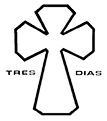A Model System for Rector Training
Then I heard the voice of the Lord saying, “Whom shall I send? And who will go for us? And I said, “Here am I, Send me! ” Isaiah 6:8
By Valerie Mehl
The passage from Isaiah provides the theme for our annual rector training weekend, a time for rectors from prior weekends to train future rectors. At Mid-Hudson Tres Dias, we treat every team experience as another step toward preparing future rectors. In the training weekend, prior rectors pass on lessons from their steps along the way, and potential rectors see how their training will impact both weekend candidates and future rectors.
For most communities, the weekend committee is a relatively small group, perhaps two to four members of the secretariat. We depart dramatically from that model. Our weekend committee consists of 16 prior rectors, and this committee is responsible for all aspects of the weekend phase of Tres Dias, including:
- Training the rector, chief auxiliary, head kitchen auxiliary, and head prayer auxiliary,
- Qualifying spiritual directors and maintaining current spiritual director lists,
- Maintaining, ordering, and delivering supplies,
- Coordinating music directors,
- Qualifying rectors and teams,
- Assigning “shepherds” to each newly chosen rector (these shepherds work one-on-one with each rector to walk them through the entire process), and
- Providing all other support needed for the weekend.
- Does it violate the Essentials? (If it does, don’t do it!)
- Does it violate the cloister? In other words, does it involve bringing outside influences into the rollo room or where candidates are gathered? If it does, don’t do it.
- Is it good for the candidates in supporting the purpose of the weekend, or are there other factors in play? For instance, if this is something that focuses on a particular person or persons, or if it is something being done for selfish or personally gratifying needs of the rector or other leaders, it should not be done.
Previous Story
March 2018 President's Letter
Next Story
